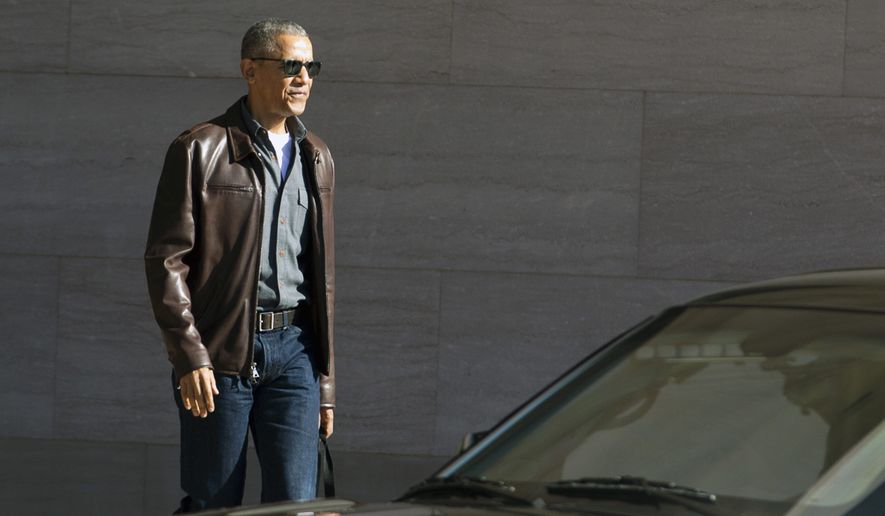Former President Barack Obama says there’s nothing wrong with Obamacare that couldn’t be fixed by President Trump doing a better job of managing the health care law.
Emerging Thursday from his post-presidency cocoon, on the seventh anniversary of the Affordable Care Act and the very day that Mr. Trump was struggling to win votes to repeal it, Mr. Obama took a victory lap, saying his signature law reset the terms of the health care debate, added millions of people to the insurance rolls and improved hospital care, saving nearly 100,000 lives so far.
“The reality is clear: America is stronger because of the Affordable Care Act,” Mr. Obama said.
Mr. Trump was having none of it.
“President Obama must be feeling the time is up,” White House press secretary Sean Spicer said.
The former president, he said, was changing the goal posts and obscuring the failures of the law, which has dominated the political debate for the past decade.
Democrats hemorrhaged seats in Congress in the wake of Mr. Obama’s 2010 signature of the act, passed after a messy legislative fight with not a single Republican supporting the bill.
Now it’s Republicans who are in chaos and Democrats who are withholding their votes and cheering from the sidelines as conservatives battle with Mr. Trump.
House Minority Leader Nancy Pelosi, California Democrat, said Thursday that the new president, a self-proclaimed master deal-maker, made a “rookie’s error” by agreeing to an artificial deadline of March 23 — the anniversary of Mr. Obama’s original signature — for getting a bill through the House.
“Rookie’s error for bringing this up on a day when clearly you’re not ready,” she said.
Mrs. Pelosi was Mr. Obama’s chief cheerleader during the Obamacare debate, and now is its staunchest defender as Democrats fight a rearguard action.
Mr. Obama said Democrats have plenty of ammunition to fire at critics.
He also said that while health care prices are rising — contrary to his goal of bending the cost curve — they are going up at a slower rate than previous decades. Analysts say that was chiefly the result of a pause in the hike of prescription drug costs and that the future likely will see bigger increases, even under Obamacare.
Most critically, though, Mr. Obama said his law is not in the dreaded “death spiral” that Republicans and some health care executives have said. Under the death spiral, young healthy customers are chased from the marketplace by rising costs, leaving an older, sicker population that requires even higher premiums and deductibles, lifting prices even higher — and chasing more people from the market.
“While it’s true that some premiums have risen, the vast majority of marketplace enrollees have experienced no average premium hike at all,” he said.
That’s because the more their plans cost, the more taxpayers shell out to help pay the premiums, the Congressional Budget Office said in an analysis this month.
Mr. Obama said Obamacare will remain stable “so long as the law is properly administered” — a challenge aimed straight at Mr. Trump.
Enrollment numbers have never hit the Congressional Budget Office’s projections, but this year, for the first time, they dropped on a year-to-year basis.
Democrats blamed Mr. Trump, who oversaw only the final 11 days of enrollment. That was when the numbers fell off their pace, Democrats said.
Mr. Trump has already made several tweaks to the law, using the same executive branch powers that Mr. Obama used, to give insurers more predicability about the markets next year.
His administration promises even more unilateral changes — what he calls phase two of the Republicans’ three-part repeal-and-replace plans.
Even as they rejected his latest bill, Republicans praised Mr. Trump for his negotiating skills.
“At this point, the president’s engagement is unparalleled, I believe, in the history of our country,” said Rep. Mark Meadows, a North Carolina Republican who is one of the big holdouts. “This is a president that wants to get things done.”
He and other conservatives blamed the chaos on the legislative process orchestrated by House Speaker Paul D. Ryan, Wisconsin Republican, and carefully steered clear of blame for Mr. Trump.
In her press conference, Mrs. Pelosi mocked Mr. Trump for being “transactional” in his negotiations and making changes to try to win over Mr. Meadows and other conservatives.
She said Democrats don’t do that sort of legislating.
“We are not transactional,” Mrs. Pelosi said. “We only can convince people about the merits of the bill.”
A reporter challenged Mrs. Pelosi, pointing to the “cornhusker kickback,” a sweetheart deal that then-Senate Majority Leader Harry Reid, Nevada Democrat, included to pay for more of Nebraska’s Medicaid, in exchange for winning the vote of then-Sen. Ben Nelson.
“It came out of the bill. It came out of the bill,” Mrs. Pelosi said. “You remember, that came out of the bill.”
In fact, the provision remained in the bill that cleared Congress — but was stripped in a follow-up budget reconciliation measure, which is the same tactic Republicans are now using to try a repeal.
Mrs. Pelosi didn’t address other deals Mr. Reid made, such as including billions of dollars for community health care centers, designed to earn the support of Sen. Bernard Sanders, Vermont independent, or millions of dollars in additional Medicaid money for Louisiana to win the support of then-Sen. Mary L. Landrieu.
And just like Republicans, Mr. Reid was racing a self-imposed deadline trying to get his bill through by Christmas 2009. In the end, the Senate voted on Christmas Eve.
• Dave Boyer can be reached at dboyer@washingtontimes.com.
• Stephen Dinan can be reached at sdinan@washingtontimes.com.




Please read our comment policy before commenting.